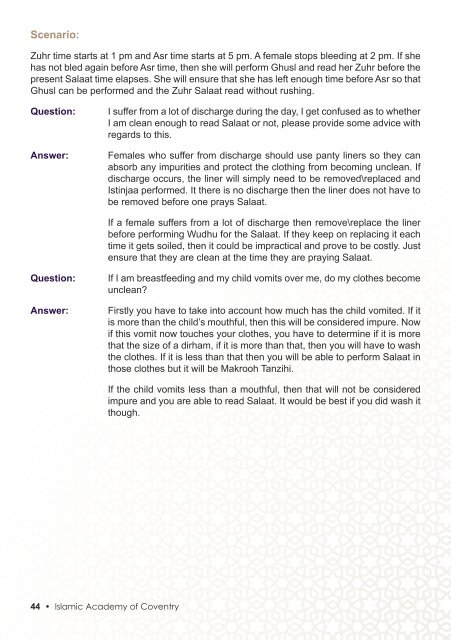Create successful ePaper yourself
Turn your PDF publications into a flip-book with our unique Google optimized e-Paper software.
Scenario:<br />
Zuhr time starts at 1 pm and Asr time starts at 5 pm. A female stops bleeding at 2 pm. If she<br />
has not bled again before Asr time, then she will perform Ghusl and read her Zuhr before the<br />
present Salaat time elapses. She will ensure that she has left enough time before Asr so that<br />
Ghusl can be performed and the Zuhr Salaat read without rushing.<br />
Question:<br />
Answer: <br />
I suffer from a lot of discharge during the day, I get confused as to whether<br />
I am clean enough to read Salaat or not, please provide some advice with<br />
regards to this.<br />
<strong>Female</strong>s who suffer from discharge should use panty liners so they can<br />
absorb any impurities and protect the clothing from becoming unclean. If<br />
discharge occurs, the liner will simply need to be removed\replaced and<br />
Istinjaa performed. It there is no discharge then the liner does not have to<br />
be removed before one prays Salaat.<br />
If a female suffers from a lot of discharge then remove\replace the liner<br />
before performing Wudhu for the Salaat. If they keep on replacing it each<br />
time it gets soiled, then it could be impractical and prove to be costly. Just<br />
ensure that they are clean at the time they are praying Salaat.<br />
Question:<br />
Answer:<br />
Is my Salaat counted if I wear nail varnish?<br />
One of the conditions of Salaat is ensuring that the body has been cleaned<br />
through ablution - Wudhu. When we perform ablution, water must touch all<br />
of the relevant parts of the body. By wearing nail varnish, this stops water<br />
reaching the nails. By water not reaching the nails, the Wudhu would be<br />
invalid; hence the subsequent Salaat will also be invalid. This would be<br />
applicable to nail varnish on the toes as well as the finger nails.<br />
There are certain products which have now appeared on the market as<br />
Halal Nail Varnish claiming that they are permeable, i.e. the water reaches<br />
the nail during ablution. We have to remember that if the water does not<br />
touch the nail then our Salaat will be invalid because the condition of<br />
washing the whole limb during Wudhu has not been fulfilled. Many people<br />
have undertaken tests which have proved negative, meaning that water<br />
has not touched the nail which would mean they would not be allowed. The<br />
advice would be that these products are not used until independent testing<br />
is carried out by an officially recognized body that has no affiliation with the<br />
products. One such test was carried out by the Jamiatul Ulema in South<br />
Africa on a certain brand and proved that the product was not permeable.<br />
Question:<br />
Answer:<br />
If I am breastfeeding and my child vomits over me, do my clothes become<br />
unclean?<br />
Firstly you have to take into account how much has the child vomited. If it<br />
is more than the child’s mouthful, then this will be considered impure. Now<br />
if this vomit now touches your clothes, you have to determine if it is more<br />
that the size of a dirham, if it is more than that, then you will have to wash<br />
the clothes. If it is less than that then you will be able to perform Salaat in<br />
those clothes but it will be Makrooh Tanzihi.<br />
If the child vomits less than a mouthful, then that will not be considered<br />
impure and you are able to read Salaat. It would be best if you did wash it<br />
though.<br />
For more information on this, see the link below.<br />
www.askimam.org/public/question_detail/25327<br />
Question:<br />
Answer:<br />
If a female is on her monthly cycle or experiencing postnatal bleeding, is<br />
she allowed to remove her pubic hair, hair under the armpits or clip her<br />
nails?<br />
Normally if a woman is in the state of ritual impurity it is Makrooh<br />
(undesirable) for her to remove her hair. So it is not recommended,<br />
however if a woman is on Nifaas (postnatal bleeding), then the hair can<br />
grow a lot in 40 days and if it gets too long then it will permissible for her<br />
to remove them. The same case will be for the nails.<br />
Question:<br />
Answer:<br />
If an item of clothing has been worn whilst a woman has been on her<br />
Haydh (monthly cycle) or Nifaas (postnatal bleeding), does it have to be<br />
washed before she can wear it for prayer when she becomes clean?<br />
An item of clothing will only become unclean if there are signs of<br />
uncleanliness on it. If a woman has worn some clothing while she was<br />
on her monthly cycle or during postnatal bleeding (Nifaas), as long as it is<br />
ritually clean then it can also be worn afterwards.<br />
44 • Islamic Academy of Coventry <strong>Female</strong> <strong>Hygiene</strong> • 45


